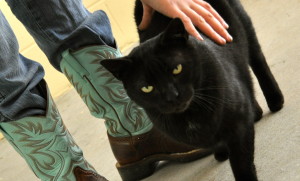How to be our favorite client:
As the official feline office manager, I am generally a fan of anybody who walks through our door. However, there are certain traits that you, the client, may exhibit, which put you higher or lower on my ‘favorite humans’ list. Below are a few examples that come to mind:
1: Ask advice from Dr. Lacher & Dr. Vurgason (as opposed to Dr. Google)! They both went through a whole lot of school AND owned horses for their entire lives. You also know what you’ve got when you are talking with them. You never know who is on the other side of the internet! They are more than happy to talk to you, any time of day or night, whether you have an appointment or not. In fact, they would much rather give you advice than have you guessing and potentially creating problems that need to be fixed down the road. Dr. Lacher and Dr. Vurgason may send you to the internet but they will send you to sites with known great information.
2: Follow directions. This can mean following recommended doses of a prescription, following instructions on bandaging, or calling us if your horse doesn’t seem to be getting better. In most cases, the doctors are giving you directions for a reason, not just to be a pain in the butt! Many medications can have severe adverse side effects if used incorrectly. Incorrect frequency of bandage changes or improper bandage application can have dire consequences. If your horse has a corneal ulcer that is not getting better with the initial set of eye meds we prescribed, we need to see it again right away! I promise you, following directions will make you and your horse happier in the long run. If your horse thinks our directions are stupid we can have one of our amazing technicians help or we can board your horse at the hospital (this comes with complimentary daily cat scans from yours truly). If you have questions about the directions your doctor gave you, please refer to #1.
3: Keep up with routine care. Many of the problems that the doctors and I see on emergency could have been prevented simply with proper maintenance. This includes regular hoof trimming/shoeing, feeding a healthy and appropriate diet, regular fecal egg counts/deworming, routine dental care, and keeping current on vaccinations. This is definitely a case of an ounce of prevention is worth a pound of cure! If you have any questions about how often your particular horse needs each of these types of maintenance, see #1. By now you should see a theme forming: call us! We are always available to hep!!
4: Keep your appointment. Most of you are pretty good about this, but every once in awhile you will decide your horse really doesn’t need to be vaccinated twice this year…and anyway you are on a budget. Or, well the cut on his leg looks like it’s getting better, so he probably doesn’t need that second antibiotic shot. If the docs recommended a recheck for your horse’s problem, I’m sure there was a good reason! And as far as keeping up with vaccinations goes, see #3. Questions? See #1.
5:Be ready for the costs of having horses. Here is where cats are, once again, far superior to horses. Colics, eyes, bad cuts…horses know how to rack up a large bill quickly. There are several great options available to help with the cost of horse emergencies. And horses will be horses so there will be emergencies. Insurance, SmartPak ColiCare, savings accounts, and CareCredit are just a few options available. Think about what you can and will spend on each of your horses and be ready to make tough decisions before you absolutely need to. We understand the stress involved when we have to hand over a large bill but remember they have to make sure the cat is well fed!
So there you have it. The 5 keys to being the cat’s meow. May your litter box be clean and your food bowl full.

